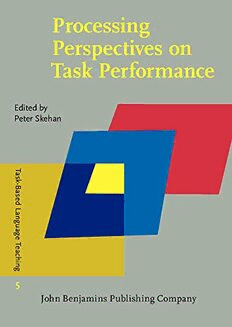Table Of ContentProcessing Perspectives on Task Performance
Task-Based Language Teaching:
Issues, Research and Practice (TBLT)
Task-Based Language Teaching (TBLT) is an educational framework for the
theory and practice of teaching second or foreign languages. The TBLT book
series is devoted to the dissemination of TBLT issues and practices, and to
fostering improved understanding and communication across the various clines
of TBLT work.
For an overview of all books published in this series, please see
http://benjamins.com/catalog/tblt
Editors
Martin Bygate John M. Norris Kris Van den Branden
University of Lancaster University of Hawaii at Manoa KU Leuven
Volume 5
Processing Perspectives on Task Performance
Edited by Peter Skehan
Processing Perspectives
on Task Performance
Edited by
Peter Skehan
St. Mary’s University, Twickenham
John Benjamins Publishing Company
Amsterdam / Philadelphia
TM The paper used in this publication meets the minimum requirements of
8
the American National Standard for Information Sciences – Permanence
of Paper for Printed Library Materials, ansi z39.48-1984.
Library of Congress Cataloging-in-Publication Data
Processing perspectives on task performance / Edited by Peter Skehan.
p. cm. (Task-Based Language Teaching, issn 1877-346X ; v. 5)
Includes bibliographical references and index.
1. Language and languages--Study and teaching. 2. Task analysis in education. 3. Competence
and performance (Linguistics) 4. Second language acquisition. 5. Second language
acquisition--Methodology. 6. Task analysis in education. 7. Cognitive learning. 8. Psy-
cholinguistics. I. Skehan, Peter.
P53.82.P84 2014
418.0071--dc23 2013050660
isbn 978 90 272 0725 8 (Hb ; alk. paper)
isbn 978 90 272 0726 5 (Pb ; alk. paper)
isbn 978 90 272 7041 2 (Eb)
© 2014 – John Benjamins B.V.
No part of this book may be reproduced in any form, by print, photoprint, microfilm, or any other
means, without written permission from the publisher.
John Benjamins Publishing Co. · P.O. Box 36224 · 1020 me Amsterdam · The Netherlands
John Benjamins North America · P.O. Box 27519 · Philadelphia pa 19118-0519 · usa
For Daniel
Table of contents
Series editors’ preface to Volume 5 ix
Preface xi
chapter 1
The context for researching a processing perspective on task performance 1
Peter Skehan
chapter 2
On-line time pressure manipulations: L2 speaking performance under
five types of planning and repetition conditions 27
Zhan Wang
chapter 3
Task readiness: Theoretical framework and empirical evidence
from topic familiarity, strategic planning, and proficiency levels 63
Bui Hiu Yuet Gavin
chapter 4
Self-reported planning behaviour and second language performance
in narrative retelling 95
Francine Pang & Peter Skehan
chapter 5
Get it right in the end: The effects of post-task transcribing
on learners’ oral performance 129
Li Qian
chapter 6
Structure, lexis, and time perspective: Influences on task performance 155
Zhan Wang & Peter Skehan
chapter 7
Structure and processing condition in video-based narrative retelling 187
Peter Skehan & Sabrina Shum
viii Investigating a Processing Perspective on Task Performance
chapter 8
Limited attentional capacity, second language performance,
and task-based pedagogy 211
Peter Skehan
Author Biodata 261
Index 263
Series editors’ preface to Volume 5
It is our pleasure to introduce the fifth volume in this series, a collection edited by Peter
Skehan and entitled Investigating a Processing Perspective on Task Performance. This
book is in many ways a culmination of work initiated by Skehan some two decades ago,
as it builds upon the theoretical perspectives of his Tradeoff Hypothesis and extends
from the considerable associated research into task types, characteristics, and imple-
mentation conditions. Of primary interest in this volume is the relationship between
task design variables and their effect on how language learners produce speech for
communicative purposes. Tasks here are generally brief spoken narratives of the sort
that have grown in popularity as primary pedagogic tools of task-based instruction that
seeks to provide a focus-on-form and – meaning simultaneously. Beyond their apparent
face value as opportunities for practicing L2 speech and developing fluency, such tasks
offer the intriguing possibility of drawing learners’ attention to form-m eaning con-
nections, initiating learner analysis and restructuring of their interlanguage, improv-
ing their control of the language, and ultimately pushing the development of language
knowledge and proficiency. The main goal here is for learners to be able to produce
complex, accurate, and fluent L2 speech, with tasks being employed to integrate the
various learning processes; and the key question then is “how?”
Beginning in the early 1990s, and presented first in an influential article “A frame-
work for the implementation of task-based instruction” followed by the highly cited
book A Cognitive Approach to Language Learning, Peter Skehan proposed that learner
performance on these kinds of tasks was determined in part by the fundamentally
limited cognitive resources that a person has available during speech. Telling a story,
describing a picture, explaining a process – these tasks consume the attention that
learners have at their disposal, and which, as a consequence, needs to be divided
between fluency, accuracy and complexity of their performance. In this respect, cer-
tain tasks have been claimed to make greater or lesser demands on cognition; in a
similar vein the conditions under which learners are asked to perform tasks may influ-
ence what they focus on in their production. For example, providing learners with the
opportunity to plan prior to telling a story may free up attentional resources, result-
ing in spoken narratives that are lexically more diverse, syntactically more complex,
grammatically more accurate, and so on. Building from these observations into peda-
gogic implications, Skehan advocated for cycles of tasks that were selected, designed,
and sequenced to intentionally shift learners’ attention between a focus on fluent and
efficient communication versus the opportunity to restructure and ‘push’ language
production at the cusp of interlanguage development.
Skehan’s groundbreaking ideas, along with the competing theoretical position of
Peter Robinson’s Cognition Hypothesis (see volume 2 in the TBLT:IRP series), inspired

